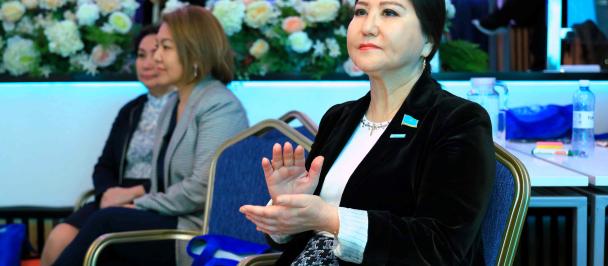
Astana hosted a citywide case championship dedicated to the launch of the global campaign "16 Days of Activism Against Gender-Based Violence", where students could raise awareness of gender-based violence and offer their practical solutions. Five teams representing the capital's universities had the opportunity to demonstrate their creative approach to cases of gender-based violence developed by UN agencies.

Opening the event, Stephen O’Malley, UN Resident Coordinator a.i. in Kazakhstan, said:
“The participating students embody the energy, creativity and innovation needed to break the cycle of violence and foster a culture of respect and equality in society. Their contributions can challenge outdated norms, propose bold solutions and drive meaningful change. The 16 Days campaign is a call to recommit to the ideals of the Beijing Declaration and work tirelessly for a future free of violence.”
The main goal of the event is to involve young people in actively addressing gender-based violence and to raise awareness of its impact on society. The cases proposed by the organisers of the championship show the impact of gender-based violence in its various manifestations - from economic to psychological damage. The format of the case championship involves participants immersing themselves in the context of the problem (case) and offers them the opportunity to demonstrate their critical thinking and research skills in problem solving.

Following the championship, the event organizers - the UN Resident Coordinator’s Office, the UN Development Programme (UNDP), the UN Population Fund (UNFPA), the UN Children's Fund (UNICEF), the World Health Organization (WHO) and UN Women in partnership with Maqsut Narikbayev University listened to the teams' presentations and awarded the winners with valuable prizes. The decision to hold a case championship among students was not made by chance: youth in Kazakhstan, being agents of change, today make up 31 percent of the country's population.
In his speech, Talgat Narikbayev, Chairman of the Board of Maqsut Narikbayev University, emphasized that the problem of violence against women and girls in Kazakhstan remains acute. The growing number of such cases requires drastic measures. On the instructions of the President of the Republic of Kazakhstan, the law on strengthening the protection of the rights of women and children was adopted in April 2024. He also pointed out that this case championship is a unique opportunity not only to draw attention to this problem, but also to propose effective mechanisms to combat it:

“Today's case championship is a unique opportunity for you, future leaders, not only to draw attention to this problem, but also to propose mechanisms to solve it. I am glad that Maqsut Narikbayev University can become a platform for dialogue, uniting the efforts of international organizations and youth. I believe that your ideas and energy will be the driving force that will help create a safe and fair society for all.”
Additional information:
In the world:
One in three women experience some form of violence in their lifetime. Girls are at particular risk of violence — every fourth teenage girl experiences violence from her partner.
Femicide is the intentional killing of a girl or a woman based on gender. By the end of 2023, more than 51,000 girls and women were killed by their family members or intimate partners worldwide. Thus, every 10 minutes there is a case of femicide on the planet.
In Kazakhstan:
17 percent of women — one in six women in the country who have ever had a partner — have experienced physical and sexual violence from their partner, and such acts of violence have occurred repeatedly. Half of the women who have experienced physical violence from their partner reported its severe forms.
One in five women – 21 percent – have experienced psychological violence from a partner in their lifetime. And almost a quarter of all women who have experienced physical, sexual or psychological violence have experienced all three forms of violence.
Girls and women with disabilities are subject to violence at much higher rates than their male, female and non-disabled peers.
What is femicide?
Femicide is a gender-based killing. It is a universal problem and the most brutal, visible and extreme form of gender-based violence experienced by women and girls.
16 Days of Activism Against Gender-Based Violence
Every year, the United Nations celebrates 16 Days of Activism Against Gender-Based Violence around the world, calling on all Member States on behalf of the UN Secretary-General to “UNiTE to End Violence against Women.” This year’s campaign hashtag is #NoExcuse #Ақталмайды #НетОправдания. The official colour of the global campaign is orange.
The global campaign “16 Days of Activism Against Gender-Based Violence” starts annually on November 25, the International Day for the Elimination of Violence Against Women, and ends on December 10, the World Human Rights Day.

 Locations
Locations











